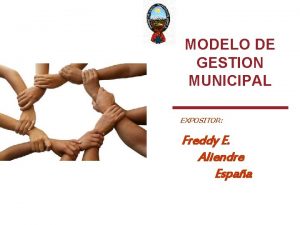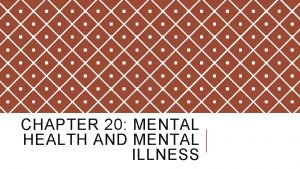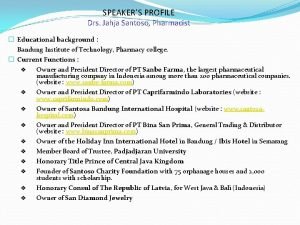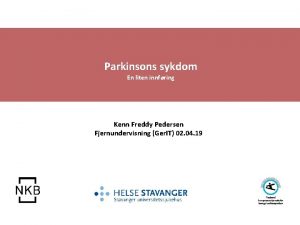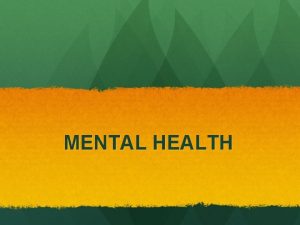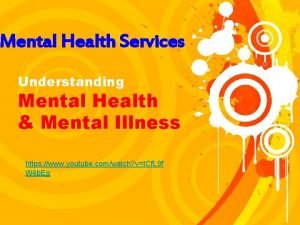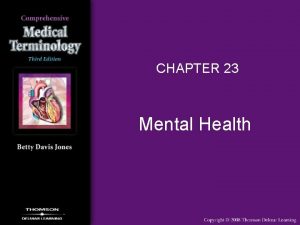Mental Health Dr Freddy Hamilton GP registrar 12












- Slides: 12

Mental Health Dr Freddy Hamilton, GP registrar 12 June 2019

The impact 1 in 4 adults, 1 in 10 children Many more know or care for people with mental illness 40% of GP appointments – and increasing 14% of NHS budget. Wider costs to the economy £ 77 billion. Impact on an individual

The conditions Depression Anxiety Insomnia Effect of chronic physical illness (eg back pain) Dementia More serious (eating disorders, PTSD, bipolar disorder, psychosis)

Prevention Exercise Social contact Good physical health – cannot separate mental and physical Limit alcohol use Avoid illicit drugs Healthy diet Talk about feelings Do something you are good at – “flow” Get help early

The warning signs Low mood Inability to enjoy activities/relationships Difficulty sleeping Tiredness/Fatigue Reduced/Increased appetite Poor concentration Anger/Fear/Worry Suicidal thoughts In a relative/friend – not leaving home much, not looking after their appearance, alcohol/drug use, behaviour change

Getting help Exercise – gentle stroll to triathlon MIND – very useful website Self-help books and websites Mindfulness GP IAPT - self 0 r GP referral Community Mental Health Teams (need referral) Counsellor in practice – longer term

Talking to the GP Prepare – take time to think about Book double appointment if there is a lot to discuss Write down thoughts/feelings – say what you feel, be honest, use your own words Bring a friend/family member who knows you well No problem is too small – it is better to get help early

In a crisis Emergency apptmt with GP Call Samaritans – 116 123 (open 24/7) Go to A&E Often the extreme feelings pass in a few hours and with support over that time you are less likely to do something dangerous

The older person One third of mental health service activity is concerned with people over 65 Depression, loneliness, dementia – often ignored and focus is on physical health Low mood often seen as normal part of getting old Loneliness – as harmful to your health as 15 cigarettes a day Age UK Befriending Service

Dementia increasing memory loss and problems with thinking, problem-solving, language, planning Symptoms vary: finding the right word, getting lost, losing keys/phone, forgetting appointments, losing track of time/date, can’t cook a meal or do the washing Also mood and behaviour can change – out-of-character or depressed If affects everyday life - dementia

Dementia Not natural part of aging. Many become forgetful, but not everyone gets dementia Caused by Alzheimers, Stroke – loss of nerve cells in brain Progressive Mostly after age of 65 Growing problem as population ages In UK, approx 850, 000 1 in 3 people will care for a person with dementia at some point

See GP for initial assessment. They will do tests, including memory testing, blood tests, urine test, brain scan. Then will refer to specialist if concerned – memory clinic No cure, but there are drug treatments that can slow down progression and help with mood Help with dementia Also: advice about day-to-day tasks, talking therapy, cognitive stimulation, devices at home (eg medication boxes, calendar clocks), group activities such as exercise, music, art, support from carers. Prevention – BP control, stop smoking, exercise, healthy weight, limit alcohol, healthy diet (low in saturated fat/sugar/salt), staying mentally and socially active
